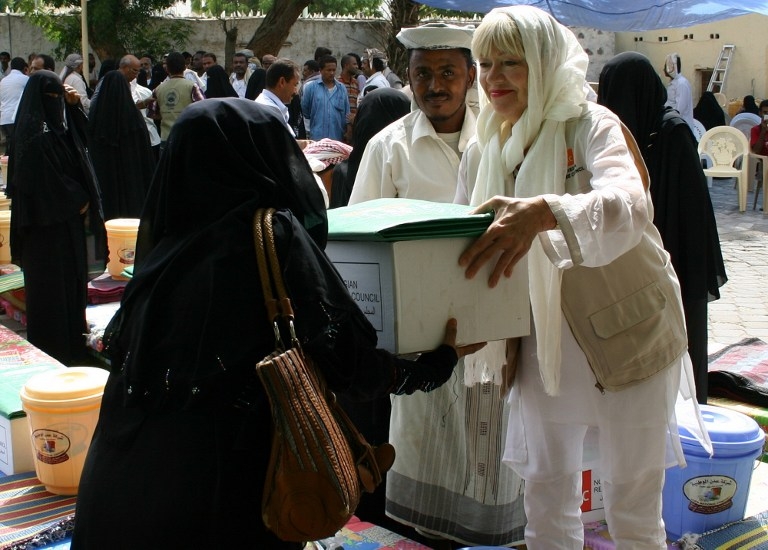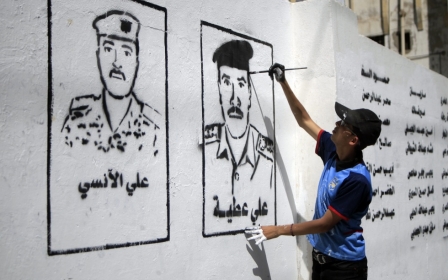The NGO-isation of Yemen

A portrait of toppled President Ali Abdullah Saleh hangs crooked from a burned building. Down the street lays another portrait across the entry of Bab al-Yemen, which literally means “The Gate of Yemen,” announcing the celebration of a new Yemen. A poster of President Abdu Rabu al-Hadi is pinned on top of the entrance. Inside Bab al-Yemen, is an old market place where hundreds of small shops sell many different items and people from all over Sana’a come to do their shopping.
On the drive to Rada’a city, a 176km drive from Yemen’s capital, Sana’a, there is little to no infrastructure, besides the checkpoints where young children and their parents gather, targeting cars as they stop to sell water, fruits and the natural stimulant, Qat, that is popular among locals. Faded UN signs decorated the impoverished town, advertising their development projects that have long been abandoned or never followed through.
Despite $6.2 billion dollars pledged in aid since 2011, the lives of Yemenis remains troublingly fray. After the ousting of President Ali Abdullah Saleh in March 2012, Yemen became a hot pocket for international aid and a testing ground for counter-terrorism strategy. Yemen, to much of the west, became known as “the model.”
But the Yemenis tell a different story.
In short, aid and the NGO sector in Yemen have been counter-productive, allowing for corruption to continue and undermine local movements for social change, often in support with the Yemeni state and elites.
Three years have passed since Yemenis stood together, waving their banners and chanting messages of change and justice. Together they brought down three decades of institutionalized violence and oppression.
Since the uprising, many well-qualified young people began to look for work in the fastest rising field in Yemen, the Non-Governmental Organization (NGO) sector. This particular sector of work was viewed as a vehicle for development, democratization and social change. For many, it was a close representation of civil society. With an $8 million grant approved by the World Bank, NGO’s specific to grassroots civic initiatives and formed during and prior to the revolution turned into top-down structures encouraged from abroad. The offer of financial support, in addition to a well-paying job seduced many Yemenis into diverting their energy from organizing on the ground independently and voluntarily to “program development” work. The funding given was meant to help local NGOs promote national dialogue, democratization, gender equality, good governance, and respect for human rights.
Despite NGOs scaling up their presence across the country, they are nothing new to Yemen. NGOs and civil society organizations, (CSO’S) rose to prominence in the 20th century. They particularly flourished during the 1962 revolution in the north, to compensate for the breakdown of the state, and after the North and South unity in 1994. Funds from international donors started pouring in, in an effort to address the political repercussions of structural changes that occurred in Yemen. To date, the number of organizations registered, according to the Ministry of Labor and Social Affairs exceed 13,000, a 24 percent increase from after the 2011 uprising.
So understandably, because of all the aid pouring into NGOs, the young and eager took jobs in this sector, in hopes of working towards a new Yemen. But what happens when projects implemented are taken by NGOs, and decided solely by international aid from people far removed from the struggle? Well, while many organizations have good intentions, a majority of the time, harm is done. With no financially sustainable framework, and without support from communities impacted by the issues, NGOs are working with a significant accountability deficit. Hence, the process of helping Yemen turns into a business, a business which employs “cheap” locals, “western experts” and where NGO’s are predominately accountable to their donors, not the people they are entrusted to support.
In this process, the NGO-model contributes to its share of abuse and co-optation of the Yemeni struggle for social, economic and political justice. The youth movement’s demands have yet to be addressed as initiatives have become increasingly instutionalised and disconnected from the ground, prioritising funders over people and normalising an exploitative culture for the way their work is ultimately carried out. Their loyalty to the Yemeni youth revolution is long gone.
The Western savior complex
Despite the human rights approach and rhetoric adopted by NGOs in Yemen, numerous Yemeni workers have complained of discriminatory practices between employees, whether in the hiring process or employment conditions.
Rabie Khaled Shaiban, 24, graduated with a marketing degree from City College, San Francisco. Shaiban returned to Yemen in 2011, and according to him, his Yemeni passport is hindering him from finding employment. “I can’t find a job. All the jobs are prioritized for foreigners, even though we have the same qualifications.” He explains. “Sometimes, they don’t even speak Arabic, how are they going to do some of the required work if they don’t even speak the language of the people?”
Nina Aqlan works for a foreign-funded Yemeni NGO, and has felt the barriers between her and her employees: “Yemenis and foreigners will have the same job description, responsibilities and qualifications However, when it comes to work and pay, there is a significant difference between a foreigner and a Yemeni.”
If we look at the dynamics of some of these NGO’s and the work they produce and the relationships between people inside these organizations, it becomes clear that the power of NGOs, particularly internationally backed NGO’s in Yemen, is complex and heavily interconnected with the myth of “the western expert.”
“For a foreigner doing my job their net salary is $1,500 per month, not including their risk security payment which is an additional $3,000 per month and an “R&R” which gives foreigners a leave every 6 weeks and cash of $1,200. My salary is $900 and my risk security is $400.” Ahlam al-Sagheer, 27, working for a UN agency told me. “And what about us? We do most of the work. They can’t even go out on the field - we do. We are in riskier situations than they are; yet they get paid more. We have the same stress, if not more. Why do they get double or triple our salary?” What’s the difference between me and my colleague other than our passport?”
Sagheer went on to say that 60% of the donor money that comes in is for foreigners. For her, that money should be going towards community projects and hiring locals. And with the increase in bombings in Sana’a, Sagheeer is almost certain that the risk security allowance for foreigners will jump even more, while hers will stay the same.
The “Western expert” problem is a deeply embedded concept, pressing that any problem in any part of the world can - or even must - be solved by westerners. Many Yemenis are concerned about this dependency on “aid” and “western help”. Internationally backed NGOs hire foreigners, and although usually with very good intentions, these internationals, many times, come and carry with them a mentality that view themselves and their activities as the only solution to the Yemenis “complicated” problems. This mentality, whether obvious or subtle, is the long-term product of an ideological phenomenon that has history of colonization and imperialism.
“You can't buy us, and you can't buy democracy either.” says Hossam, who is among the millions of unemployed youth facing a shaky labor market.
An inferior mentality and an “unequal” relationship, has allowed international funders to influence the work, priorities, and direction of local NGOs, pushing them to adopt issues, language, and structures they want, rather than those preferred by the Yemeni people. The aid community has consequently turned NGOs and CSOs into a dependent and vulnerable community.
“International and local NGOs face significant difficulties tailoring programs to the needs and realities of the Yemeni people, especially in a competitive and donor-driven funding environment. We are instead forced to formulate our strategies and goals in-line with donor priorities and interests.” said a Program Officer at UNICEF-Yemen who wishes to remain anonymous.
Without support led by communities impacted by the struggle, NGO “solutions” will only end up reinforcing the same dynamics between the “west” and the “east” that created the global economic and political inequities that facilitate classism, racism, sexism and all other oppressions in the first place.
The “building democracy” effort in Yemen has revealed that development has become a commodity. Whose perspective do NGOs represent? The Yemeni people deserve better, yet their oppression has historically generated profits for the elite, through labor, and now as a laboratory for NGO led neo-liberal development. Within this context, how long could the proliferation of NGOs in Yemen last? And if NGOs were put under the radar, would they change?
In order to work towards democratization, a different approach is needed with a different vision and a more sustainable power base. Yemen’s demands for social-political and economic justice will be addressed only when donors and NGOs do less, stepping back and allowing communities impacted by their struggles to dictate the agenda, priorities and concerns.
Stay informed with MEE's newsletters
Sign up to get the latest alerts, insights and analysis, starting with Turkey Unpacked
Middle East Eye delivers independent and unrivalled coverage and analysis of the Middle East, North Africa and beyond. To learn more about republishing this content and the associated fees, please fill out this form. More about MEE can be found here.





